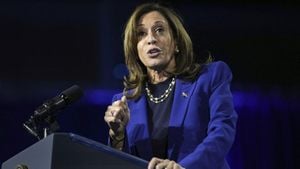The 2024 U.S. Presidential Election is shaping up to be one of the most contentious and impactful ones for Jewish Americans, particularly against the backdrop of rising antisemitism and the Israel-Hamas conflict. With both former President Donald Trump and current Vice President Kamala Harris vying for their party's nomination, the Jewish vote is becoming increasingly polarized and complex.
Recent engagement by Jewish voters indicates significant mobilization efforts, especially from Orthodox communities. Crown Heights, the heart of the Chabad-Lubavitch movement, is at the forefront of voter mobilization campaigns aiming to boost turnout among community members. Rabbi Yaacov Behrman of the Jewish Future Alliance emphasizes the importance of exercising the right to vote, declaring, “Anti-semitism is on the ballot. October 7th is on the ballot,” referring to the date of the Hamas attack on Israel, which has significantly affected local sentiments.
Underlying these calls to action is the realization among many Jewish voters—especially those who may have felt their voices were muted—that local electoral outcomes can lead to substantial changes. Behrman points out the dramatic increase from just 479 Jewish community voters during the 2013 mayoral primary to 2,696 by the 2021 mayoral primary. Such leaps make it clear the Jewish community's resolve to be heard is intensifying.
The shift is especially pronounced among Crown Heights' Orthodox Jews, who traditionally leaned Republican but are now witnessing changes as young voters gravitate toward Democratic ideals—largely due to heightened concerns about safety and educational adequacy. The community, which previously had high turnout rates, experienced decline over decades, as many voters felt their votes did not matter. Behrman advocates for direct participation to signal to elected officials their constituency’s significance, pointing to their role as watchdogs over impending legislation affecting their lives.
On the campaign trail, Trump has focused his rhetoric on garnering Orthodox votes by engaging personally with community leaders and addressing issues pertinent to them, such as crime and education. He has drawn attention to his past policies—like moving the U.S. embassy to Jerusalem and the Abraham Accords—which remain significant points of discussion among conservative Jewish voters.
Interestingly, a survey from the Israel Democracy Institute reveals 72% of Jewish Israelis favor Trump over Harris, attributing perceptions of Trump as more aligned with Israel’s interests. This sentiment is often echoed among Orthodox rabbis, where support for Trump is visible, and has seen some rabbis openly endorse him through various letters circulated within their communities.
Yet the support for Harris also finds its voice within the Jewish community, particularly among more liberal factions. A small group of 33 individuals claiming religious authority has endorsed Harris, positing her character and commitment to stability as reasons to support her candidacy. Ironically, many on this list do not adhere strictly to Orthodox practices; the endorsement raises questions about representation and identity within the Jewish electorate.
The debate surrounding endorsements is intense, with traditionalists dismissing those who support Harris as lacking authenticity within the Jewish traditions. Dov Hikind, who has been vocal against Harris's policies, pointed out, “over 95% of traditional Orthodox rabbis will be voting for Trump.” This tension underlines the generational divide between younger and older voters, many of whom are now starting to rethink how their values align with political candidates.
Public sentiment surrounding the ideological battle extends as the electoral battle creeps closer to the general election. Social media campaigns have become rife with propaganda on both sides, with varying portrayals of candidates stoking apprehension about their positions on Israel and antisemitic violence.
Simultaneously, social and cultural issues about Jewish identity continue surfacing. The recent discord within college campuses about politically charged events reflects broader societal tensions. The incident where colleges faced backlash over “Gaza solidarity sukkahs” highlighted the growing rift within the Jewish community about how best to express solidarity with varying groups.
Many Jewish voters see themselves at the intersection of these debates—struggling both for their safety and their cultural identity. Amid all this, there’s consensus on one point: turnout matters. Whether it’s Harris or Trump, mobilizing to vote transcends mere candidates and hits at the heart of community representation.
The timing feels serendipitous as organizations like the Jewish Future Alliance ramp up efforts through campaigns to send postcards and engage community discussions. Encouragement for participation aims to overcome historical apathy by reminding constituents their voices do matter. Rabbi Behrman underlines the effort's importance, saying, “Just going out to vote, no matter who you vote for, helps the community.”
Notably, these local mobilization efforts aren't happening in isolation. Beyond Crown Heights, cities across the U.S. show flickers of increased engagement as the national discourse becomes more acutely focused on issues of antisemitism linked to electoral policies. The transferring of such sentiments onto the national stage creates palpable stakes for candidates trying to resonate with Jewish voters.
The 2024 election serves as both a referendum on candidates for the Jewish community and as reflection which mirrors broader societal issues--identity, representation, and safety. With different factions within the community pulling toward conflicting narratives on candidates, how they shift their stance leading toward Election Day will similarly influence future conversations on community solidarity and advocacy.
Both campaigns have acknowledged the significant Jewish presence particularly across battleground states such as Pennsylvania. Regardless of which candidate takes the lead, more than ever, the Jewish community will not go uncounted or unnoticed this election season. The emphasis on civic engagement puts them at the forefront of political discussions for years to come—a trend pointing toward the pressing need for consideration of Jewish interests not only during elections but as part of the national policy discourse.



